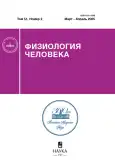Decreased efficiency of pulmonary gas exchange during the period of physical activity deprivation in sports addicts
- Authors: Krivoschokov S.G.1,2, Balioz N.V.1, Arhipova E.E.2
-
Affiliations:
- Scientific Research Institute of Neuroscience and Medicine
- Novosibirsk State University of Economics and Management
- Issue: Vol 51, No 2 (2025)
- Pages: 120-130
- Section: Articles
- URL: https://bakhtiniada.ru/0131-1646/article/view/304847
- DOI: https://doi.org/10.31857/S0131164625020087
- EDN: https://elibrary.ru/UDJLMK
- ID: 304847
Cite item
Abstract
The study is devoted to the study of the effect of sports addiction (SA) on the effectiveness of pulmonary gas exchange during the period of physical activity deprivation 27 male athletes (middle-distance runners) aged 20 to 25 years during the period of physical deprivation (lasting 2 weeks) were examined. All athletes were tested using the following questionnaires: Exercise Addiction Inventory (EAI), Temperament – Formal Characteristics of Behavior (FCB-TI), and Eysenck Personality Inventory (EPG-R). As a test load, the subjects performed a hypoxic test (breathing with a gas mixture with 10% O2 for 10 min) with the recording of cardio-respiratory and gas exchange indicators on the Oxycon Pro@ ergospirometry system (Erich Jaeger) in the initial state, at 10 min of exposure and 5 min of recovery. SaO2 (%) was measured using the BCI Autocorr (USA) ear pulse oximeter. The results of the study did not show a relationship between temperament types and the level of SA, but found a relationship between the level of addiction and the “perseverance” scale of the FCB-TI questionnaire. It has been established that oxygen consumption during hypoxic exposure and recovery period in addictive athletes is higher than in non-addicts. The dependence of the efficiency of pulmonary gas exchange depending on the level of sports skill has been established. In high-class athletes, the level of addiction does not correlate with the cost of fan costs for obtaining 1 liter of O2 when performing hypoxic load, while in athletes of average sports qualification, the level of addiction directly correlates with the efficiency of pulmonary gas exchange. Thus, the factor of sports addiction affects the effectiveness of pulmonary gas exchange under conditions of hypoxia, mainly on low-skilled athletes.
About the authors
S. G. Krivoschokov
Scientific Research Institute of Neuroscience and Medicine; Novosibirsk State University of Economics and Management
Email: krivoschokovsg@neuronm.ru
Novosibirsk, Russia; Novosibirsk, Russia
N. V. Balioz
Scientific Research Institute of Neuroscience and Medicine
Email: krivoschokovsg@neuronm.ru
Novosibirsk, Russia
E. E. Arhipova
Novosibirsk State University of Economics and Management
Author for correspondence.
Email: krivoschokovsg@neuronm.ru
Novosibirsk, Russia
References
Supplementary files









